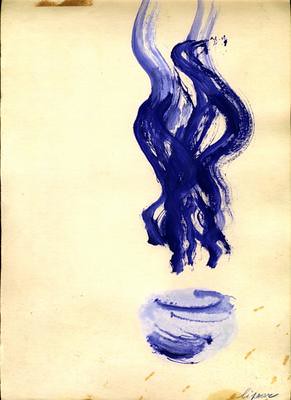The most significant event of your life calls to you, from barely beyond your perception…both imminent and impossible… a call of the heart, of the spirit, and of yourself to which you have not yet been introduced.Sacred Vow is visionary fiction of a journey toward our one true love…in its infinite expressions…bringing together two individuals from disparate realities—but one spirit—to heal the rift in the Collective Consciousness…a breach that threatens us all.
Installment 4 of 22 Sacred Vow (Dragon's Beard Publishing, ISBN: 978-0-9774271-4-7, paperback, Fiction: Visionary/Metaphysical).
Tea Ceremony (continued)
About a month later, Ian had convinced himself that he was in charge of his own choices. Despite not feeling in control of every emotion, he let down his rational guard and began pursuing another experience with the woman of that unforgettable night. Speculating that the image had been a product of a combination of environmental factors in his study, Ian decided to duplicate the circumstances to the best of his memory.
His efforts did not produce a vision the next few times he had tea in the study. Perhaps, Ian thought, he was trying too hard. In time, however, the woman did reappear. This time they did not meet in the forest, but in his study.
The progression of her appearance was precisely the same as before. The items in his focus began to blur. Then a transparent outline of her figure emerged. As she began to take form, Ian noticed a growing tension within himself. He speculated it was the conflict between what he perceived and what his logical mind could accept. Forcing himself to relax, the queasiness he was feeling disappeared quickly.
She was wearing a much more formal-looking garment with a cowl, embroidered with many of the same symbols as the tunic she had worn before. When she fully materialized at the other end of the study, she raised both hands and gracefully pushed the hood back from her face, and down onto her shoulders. A feeling of joy swept over Ian as he saw her smiling face unveiled.
His pretense of scientific research fled the moment she arrived. In the brief instant before total abandonment into the moment, Ian took mental note of the genuineness that denied what he perceived as merely visual. Nor was Ian stirred to know why he felt what he did, but allowed himself to revel in it.
Ian was disappointed that the woman did not offer a kiss on this visit . . . and a visit was what it felt like to him. Instead, she slowly raised a palm in salutation. He got up from his chair and welcomed her to his home.
“It’s so good to see you again, my friend,” he said. “Come and have a seat with me.”
She shook her head and pointed to her ear. Ian understood that she could hear no more of what he said than he had heard from her during their last visit. Turning to his recliner, he motioned to it with his hand. She declined, pressed her hands together as if in reverent thanks, and lowered her head slightly.
They stood, smiling and staring at each other. Ian did not know what she was feeling, but he was certain that their lack of dialogue did not limit their interaction. For his own part, Ian felt much communication was taking place, without the need of a single sound.
She glanced about the room, eventually gesturing as if to ask if it would be all right for her to have a look at a pottery piece that displayed stamped Celtic symbols.
“Sure,” he said. “Make yourself at home.” He rushed over to join her. “It’s made by a potter who lives in the mountains where I go sometimes. I love the symbols that the artist has used.”
His visitor stooped to look closely at the miniature monolith. She pointed to a symbol, a triskele, looked up at him, and made a comment he could not hear. Ian raised his hands to either side of his chest, palms upward, and shrugged his shoulders to indicate that he did not understand what she meant. Standing upright again, she pointed to a triskele on her garment.
“They are the same!” he said. Ian wondered if she was from a Celtic culture.
He knew, however, that the triskele was not unique to the Celts.
Wishing to present the woman with a gift, Ian picked up a small candleholder that also bore the triskele design and offered it to her.
“Please, let me give you this.”
She appeared grateful of his offer, but shook her head, declining politely.
“Please,” he insisted.
After pausing for a moment—that Ian took to be considering how to respond—she slowly reached out a hand as if to touch the pot. Excited that she was accepting the gift, he further extended his arm. Without ever touching the pottery, her hand jerked away and her face took on a look of fright.
This movement caused Ian to quickly withdraw his outstretched hand and almost drop the candleholder. After recovering his composure, he noticed she was smiling again, but she had both hands up in front of her, palms out, signaling that he should not bring the pottery to her. She slowly pointed one hand to the place from where he had taken the pot. So, he put it back on the shelf.
With that bit of awkwardness, their visit began. Ian’s visitor relaxed and returned her attention to his offered token, gracefully nodded in thanks again, and mouthed something, about the pottery—he assumed.
Ian silently watched her and his embarrassment evaporated. The gentle woman looked up and gave him another of her enchanting smiles. Showing her about the room, he talked and laughed as if she could hear him. She responded in kind. Happily, they carried on their silent exchange.
It became apparent to Ian that she did not want to touch anything in the room, or else could not. Several times she motioned to Ian to turn an item around, so she could see its backside.
At some point, Ian’s new friend moved to have a look at a book in the bookcase. She took a couple of steps toward it—and then vanished into thin air. Ian was seized with a momentary distress, and then he was startled to find that he was again sitting in the recliner, teacup in hand. He could not understand how it was possible, but evidence suggested that he had never moved from the chair. From all appearances, Ian had been the only one in the room the whole time. But he felt certain that he knew otherwise.
Now that Ian had experienced another visit—or visions, because he interchangeably referred to the experiences by both terms, unable to conclude which they really were—he looked forward to enjoying another one. Ian planned not only to enjoy them but also to find some answers. Crafted after his experiences in computer testing, he would use a base environment of everything just like it had been the first (and second) teatime. He made the same type of tea, used the same teapot, and sat in the same chair. Everything was just the same as it had been previously.
After a couple of successful visits, he started to change one thing at a time. If changing something kept her away, Ian would return things to the way they had last been for the next tea, verify another success, and then see if he could cause a repeat failure. The first conclusion he drew was that even with the absolute replication of the first visit setup, success was not always guaranteed.













